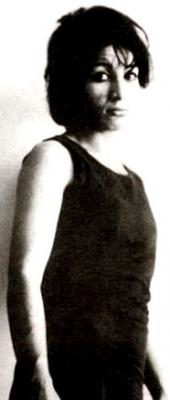
This year marks the fortieth anniversary of the acclaimed Iranian poet Forugh Farrokhzad’s death. Around the world, people are marking the passage of this remarkable women’s life and her more magnificent oeuvre of poetry. Although a number of English translations of her work have been published, many fail to capture the nuances of the Persian language, the incisive and edgy aspects of her mind, and her unique and powerful experience as a woman living through the turbulence of Iran’s 20th century modern history.
I had the opportunity to interview Iranian-American poet-translator, Sholeh Wolpe and asked her about her role as the translator of the most recent collection of Forugh’s poetry, , with a brief biography of Forugh. I wrote it like a story. Most books of translations begin with a brief scholarly biography of the poet. But I wanted something different. I wanted her story to be accessible and informative to everyone. I hope that in reading my account of Forugh’s life, the high school student will be just as fascinated with and touched by this remarkable woman as will be the professor contemplating teaching Forugh’s poems at his or her university. Forugh’s work is multi-layered and to understand her life helps the reader to understand her poems. Something interesting to note is how even in our written material we refer to Forugh Farrokhzad as Forugh, not Farrokhzad. Even some scholars refer to her by her first name. To this day she evokes a charming intimacy between herself and the reader. Her poems are intimate at many levels and one cannot help but feel a kind of familiarity with her. After reading her work it is difficult to refer to her as Farrokhzad. She becomes one’s own Forugh.
What made you select Forugh as a poet to translate?
When I first read Forugh’s poems I was no older than eleven or twelve. I fell in love with her poems, and now looking back I see that I really had no clue what she was talking about, but somehow the music of her work along with the multi-layered language she employed, as opposed to the traditionally rhymed and sophisticated language used by Iranian poets for centuries, made it possible for the young and the old to feel connected to her poems as well as the poet herself. In a way, Forugh lived the way most women secretly longed to live but lacked the daring or know-how.
Forugh in her own way secured a kind of devil-may-care freedom many women at the time would have loved to snatched from the male dominated Iranian society. However she did this at great cost to her family life. She lost the custody of her only biological son, had to spend some time in a sanitarium where she was subjected to shock therapy, and until late in her brief career endured great abuse by the media who referred to her as a “poetess” rather than a poet, featured her poetry in disrespectful waus such as with the silhouette of a naked woman, and generally refused her the seriousness and respect granted to her male contemporaries. Forugh is a poet who must be translated and translated well. She must be respected and known as we respect and know other Iranian poets such as Rumi, Hafiz, and Omar Khayyam.
How has reading her work or the work of other prominent Persian poets contributed to your own poetic journey?
I am proud to come from a very rich poetic heritage. There are two books commonly found in every household in Iran: the Quran and Poems of Hafiz. Poetry runs in the blood of most Iranians, young and old. When I was twelve I had at least fifty poems memorized and used to play a game with poetry lovers my own age where one of us recited a stanza of a poem, another would have to take the last letter of that stanza and recite another stanza of any other poem that began with that same letter. It sounds pretty difficult, but we used to keep it up for to an hour.
I used to love that game and I believe it was a common game played among kids my age and older. As far as my own poetic journey is concerned, I think I have been influenced by everything I have ever read, seen and experienced. How could it be otherwise? Still, if you look at my own poems and stories closely you’ll find that I’m always questioning, examining, and searching in an arena bigger than myself. Even when I write a poem that appears to be about me, it really isn’t. I may be a part of it but that’s all.
This year marks the 40th anniversary of Forugh’s death. How do you think a good translation of her work can elevate her to the stage of good “world” poetry such as that of Neruda, Zymborska, Milosz, etc.?
I think it’s time for the world to become better acquainted with this remarkable woman and poet who won the heart of a nation through her poetic talent, her perseverance and courage. She was years ahead of her time, both stylistically in her poetic language and in what she had to say. For the first time in the history of Iranian poetry, she dared to be a woman and write as one. She wrote about love from the perspective of a woman. She wrote about the world from the perspective of a woman. But always she was a poet first. Forugh and several of her contemporaries revolutionized the poetic language of a culture steeped in formal poetic style, and difficult vocabulary. She employed language that was simple yet multi-layered. With each reading of her poems you find yourself holding something new, yet you feel compelled to go back to each poem not because you didn’t understand it the first time through, but because you know there is more, always more. And you are never disappointed.






